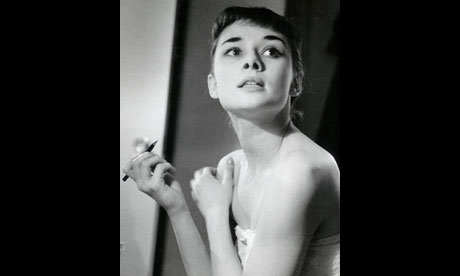Today would have been Audrey Hepburn's 85th birthday, as recognised by
Google's doodle. After a bizarre and traumatic childhood she went on to
be a Hollywood great. We profile a singular star
It used to be said that you can't be too rich or too thin. We now no longer believe this. Bankers and hedge fund managers are too rich; and now the celebrity magazines and tabloids lead the choruses of "Look how skinny's she's got!" The nicer way of saying the same thing, and making it a compliment, is to call the person elegant.
Audrey Hepburn came to be synonymous with this form of elegance. Even in her early films, her height, her skinniness and her wistfulness combined to get her noticed. In the unhelpful role of Chiquita in The Lavender Hill Mob, she attracts the attention both of Alec Guinness and of the camera: a woman visually striking and possessed of a certain quality of unhappiness.
Being slight and vulnerable, Hepburn could have made a career as one of cinema's perpetual victims – a leading lady for Alfred Hitchcock, maybe. But she was too thoughtful, and too smart in her choice of roles, to let that happen.
Somehow, you can see it all in her childhood and adolescence. Hepburn's parents were an English banker and a Dutch baroness. Both were fascists, who split up before the second world war began. Her mother took her from their home in Belgium to the Netherlands,seeking to avoid the fighting. Holland was promptly occupied by the Germans. Having been schooled in England, half-British and fluent in English, Audrey had to adopt a Dutch persona – Edda van Heemstra – for the duration of the war. We cannot blame the girl for becoming an actor, then – it was forced on her.
Another thing that was forced on her – along with the rest of the kids and most of the adults in Holland – was a lousy diet. In the latter part of the war, food supplies ran out and, like many others, Hepburn suffered from malnutrition, which led to acute anaemia and respiratory problems.
 |
| Audrey Hepburn in her dressing room in New York, making up for Gigi. Photograph: George Douglas |
It used to be said that you can't be too rich or too thin. We now no longer believe this. Bankers and hedge fund managers are too rich; and now the celebrity magazines and tabloids lead the choruses of "Look how skinny's she's got!" The nicer way of saying the same thing, and making it a compliment, is to call the person elegant.
Audrey Hepburn came to be synonymous with this form of elegance. Even in her early films, her height, her skinniness and her wistfulness combined to get her noticed. In the unhelpful role of Chiquita in The Lavender Hill Mob, she attracts the attention both of Alec Guinness and of the camera: a woman visually striking and possessed of a certain quality of unhappiness.
Being slight and vulnerable, Hepburn could have made a career as one of cinema's perpetual victims – a leading lady for Alfred Hitchcock, maybe. But she was too thoughtful, and too smart in her choice of roles, to let that happen.
Somehow, you can see it all in her childhood and adolescence. Hepburn's parents were an English banker and a Dutch baroness. Both were fascists, who split up before the second world war began. Her mother took her from their home in Belgium to the Netherlands,seeking to avoid the fighting. Holland was promptly occupied by the Germans. Having been schooled in England, half-British and fluent in English, Audrey had to adopt a Dutch persona – Edda van Heemstra – for the duration of the war. We cannot blame the girl for becoming an actor, then – it was forced on her.
Another thing that was forced on her – along with the rest of the kids and most of the adults in Holland – was a lousy diet. In the latter part of the war, food supplies ran out and, like many others, Hepburn suffered from malnutrition, which led to acute anaemia and respiratory problems.
No comments:
Post a Comment